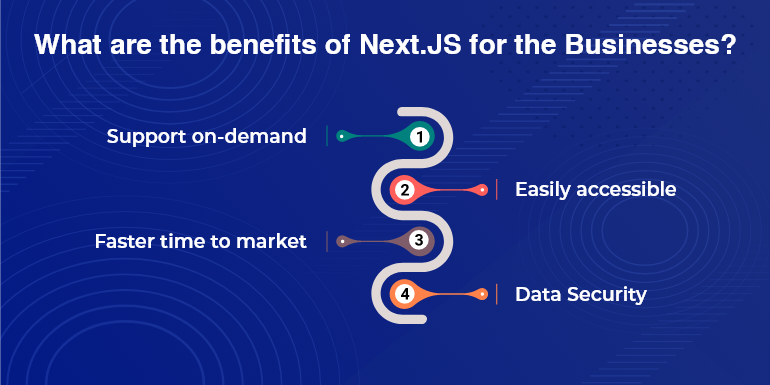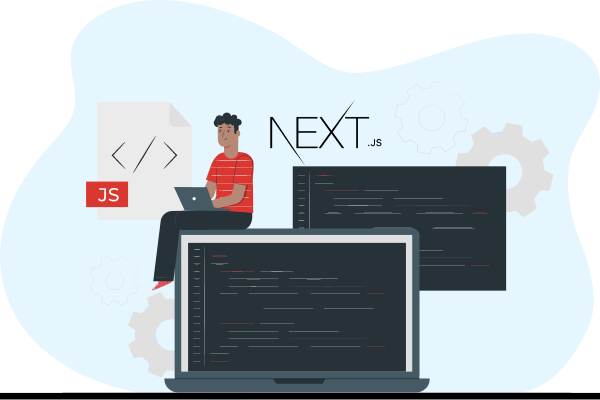Next.js is the technology that helps create high-performing web apps and fast static websites. This renowned open-source JavaScript Framework helps develop high-performing web apps. It is integrated with Server-Side-Rendering (SSR) and Static-Site Generation (SSG), which allows for building web apps.
One of the best attributes of Next.js is it allows the developers to use Next.js with React. This technology has several valuable features & components, such as automatic code-splitting, routing, and hot module reloading that allow the creation of React apps quickly & efficiently. Over 800 firms use the Next.js framework in their tech stacks, like Medium, Facebook, Binance, Circle CL, GrubHub, Vroom, UxyLabs, and more.
The immense popularity Next.js is receiving is its capability to manage the development of universal JavaScript apps, which is why most businesses are attracted to it. If you are willing to incorporate Next.js into your tech stack, this blog discusses Next.js in detail and its benefits for businesses, marketers, and ad developers.
What Is Next.JS?
This full-fledged JavaScript UI framework allows the creation of user-friendly and superior static websites and web apps with React. It handles configuration and tools related to React effectively and offers valuable optimizations, architecture, and functionalities supporting each development stage. Next.JS is powered by Webpack, Babel, and React, and it allows to build of intuitive products and solutions for web browsers running on Windows, macOS, Android, iOS, and Linux.
It helps to easily create hybrid apps that hold statistically generated and server-side rendered pages. Simply put, your pages will be highly reactive as the framework pushes your app’s client-side, offering complete interactivity and interoperability. Some renowned firms using Next JS to build great apps are Twitch, Nike, Netflix, Hulu, and Uber.
The key features of the Next.JS Ui framework are:
- Static File Serving
- Image Component and Optimization
- Built-in CSS
- Server Rendering
- Single File Components
- Automatic Routing
- Fast Refresh
- Dynamic Components
- ESLint
- Supported Browsers & Features
- Prefetching
- Automatic Code Splitting
- TypeScript Support
- Static Experts
- Data Fetching
- Lazy Loading
- Routing
- Ecosystem Compatibility
Read Also: Flutter Vs. React Native – Detailed Framework Comparison
How Can You Use Next JS, And When To Use It?
Next.JS can be used for various purposes like it allows developers to address several pain points and generate the best possible outcomes. Some critical solutions that are possible with this framework are:
- Web Portals
- Landing Pages/Single Web Pages
- JAMstack (Markup, APIs, and JavaScript) Websites
- Minimum Viable Product (MVP)
- Web Portals
- SaaS Products – complex & demanding mobile & web apps
- Client-side Rendered Apps – MPA/SPA
- Large multi-user websites – finance, retail, eCommerce, etc
- Interactive UIs
- Centralized Dashboards and Admin Panels
- Static Websites
It is also essential to understand when to use this framework to effectively bridge the gap between the project requirements and business goals. Here is the area where Next.JS can be best utilized:
- To create a tailored user experience
- To enhance marketing channels
- To observe low maintenance costs
- To ensure complete application scalability
- To improve the performance of digital products & services
- To manage constantly growing traffic effectively
So now you understand how and when you can use the Next.js framework to develop fast web apps, but what makes it the best big thing in future? Here are the benefits of Next.js for different groups of people; let’s explore.
Read Also: Top Reasons To Have A Mobile App For Your Business
What Are The Benefits Of Next.JS For The Businesses?
Every company is looking to increase its conversion rates, which directly leads to more sales. And for that, companies must use modern technologies to create a unique user experience keeping potential customers in mind. And that is possible with Next.JS as it offers total control over the final design of the websites, applications, online stores, and other digital products. It also provides various themes and plugins dedicated to a specific eCommerce platform or Content Management System (CMS).
Other benefits of Next.js for businesses are:

There is a shorter page loading time as static websites are fast by nature; hence visitors will be pleased with the NextJS websites & apps.
Support On-Demand
React and NextJS are getting increasingly popular, and hence the number of developers is also increasing, so demand will never be an issue.
Easily Accessible
Websites & apps built with Next.JS are accessible from any device, so businesses can quickly sell products & services via various sales channels.
Faster Time To Market
Next.JS allows to create superiorly rapid MVP with its many premade components. Hence, it will enable users to get quick feedback so businesses can enhance products accordingly without wasting time & money.
Data Security
Websites created with NextJS are static, and this means there is no direct connection to the database, user data, dependencies, or other sensitive information, and this ensures data security.
What Are The Benefits Of NextJS For Developers?
The framework is beneficial for web developers owing to the many featured Next.JS offers, and the Hire dedicated developers are thrilled about reusable React components that cut development costs and time. The other benefits are:
TypeScript Support
It allows automatic TypeScript configuration and compilation
Incremental Static Regeneration
It enables developers to update existing pages by re-rendering them in the background as traffic comes. This makes static content pretty dynamic.
Hybrid Server-Side Rendering SSR And Static Site Generation SSG
It pre-renders pages at build-time/request-time in a single project.
Community Support
With Next.JS gaining popularity, its community is getting more prominent and hence more contributors. It allows developers to find probable existing solutions rather than start with everything from scratch.
Built-In Image Component & Automatic Image Optimization
This functionality optimizes images and supports AVIF images, enabling 20% smaller images compared to WebP.
Code splitting: the framework reduces the size of the app’s first payload splitting code and serving components only when required.
API Routes
It can quickly create API endpoints as a Node.js serverless function.
Data Fetching
Allows to render content in various ways per the app’s use case. It includes pre-rendering with server-side rendering or static side generation and updating/creating content at runtime with incremental static regeneration.
Middleware
NextJS enables using code over configuration so that developers can run code before request completion. They can also change request-response and redirect the user from one route to another.
Rust-Based Compiler SWC
The framework transforms and minifies JavaScript code for production. It consists of a new Rust compiler with optimized bundling and compiling with ~3x faster refreshes locally and ~5x more quickly built for production.
What Are The Benefits For Marketers?
As business owners are keen to increase the conversion rate, marketers are responsible for increasing it, and for that, they require, most importantly, organic traffic growth and SEO efficiency. And with NextJS, marketers get both of these as websites & web apps are faster, lighter, and easier to scan, and this plays a vital role in enhancing Google’s ranking. With Google rankings going up, organic traffic also increases, leading to higher conversion and sales numbers.
The offering also has a unique user experience, as that turns all marketing efforts into better ROI (return on investment). It is visible mainly in the eCommerce industry, where numerous online stores look similar, and crafting a custom storefront can create differentiation from competitors.
Read Also: Salesforce Vs AWS (Amazon Web Services): What To Choose For Your Business?
Conclusion
Next.JS framework is a crucial part of React ecosystem, and it will be instrumental in making the web better, cleaner, and user-centric. So, whether you plan to launch an online store, or a complex app serving millions of users, Next.JS helps expand the user base and grow phenomenally. All you need is to partner with the right Next.JS development company that can better understand your unique business requirement and deliver desired solutions.






